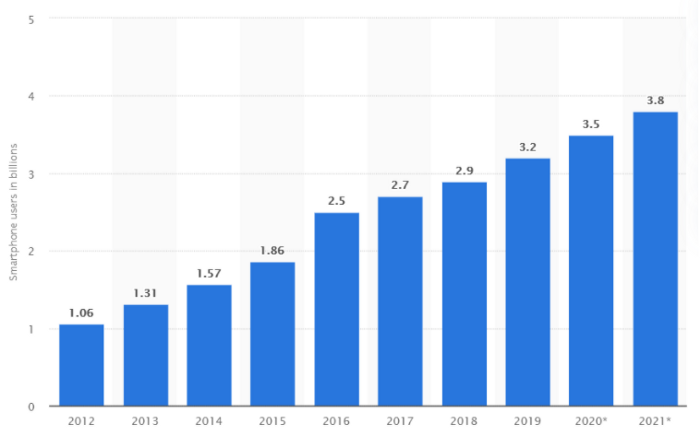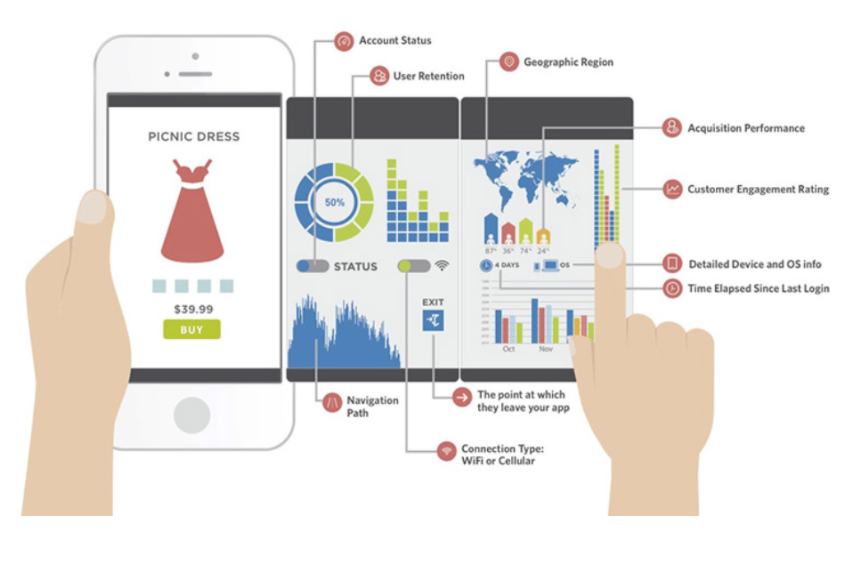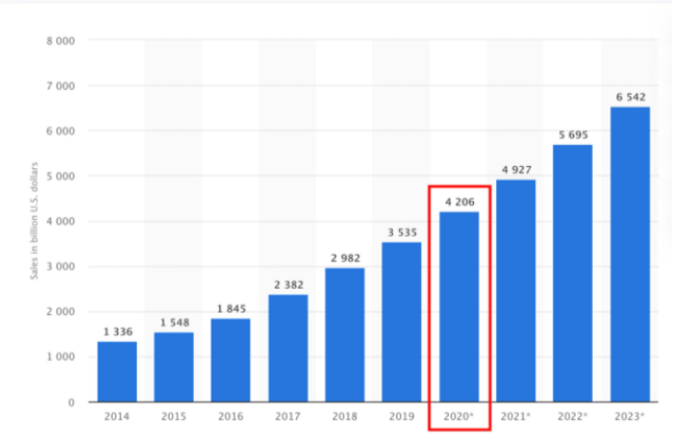If you’ve ever wondered how much time we spend on our phones nowadays, the answer might shock you — an average time is 3 hours and 15 minutes a day. That is more than 13% of a day we’re looking down at our little screens — clicking, swiping, typing, posting, liking, sharing, downloading, sending, and receiving, checking our favorite mobile app. What is even more bizarre is that the time we spend on our phones is growing rapidly — because the number of smartphone users worldwide is expanding exponentially as well. It is said that the number of users on a global level will reach up to 3.8 billion people in 2021!

Source: statista.com
Here are other fascinating facts:
– More than 5 billion people own mobile phones, and over half of those are smartphones
– People check their phones 58 times a day on average with more than half of those occurring during working hours
– Millennials spend 48 minutes texting per day, compared to the 30 minutes that boomers devote to this activity
– The average user will tap, swipe, and click their phone 2,617 times a day
– 47% of United States smartphone users say they couldn’t live without their devices
– 70% of web traffic happens on a mobile device
– Smartphone ownership statistics are showing that there are more phones than people in the world
? 80% of smartphone users are more likely to purchase from companies with mobile sites or apps.?
Why does your business need a mobile app?
No matter the industry your business belongs to, the success and sales growth of each and every company are based on several factors, such as:
- Audience Development
- Productive Marketing Campaigns
- Regular Analysis for collection of important data
- Increased Loyalty of Customers
- The advantage over the Competition
Mobile apps play a significant role in boosting each and every one of these factors ?
Audience Development
One important thing we’ve learned over the years with the everlasting technology improvement is that all information needs to be easily accessible to everybody. Gathering certain, targeted information needs to be an easy process as well. This is especially essential for businesses and their target audience.
With your mobile app installed on their phones, your target audience can reach out to you and the information your business is trying to share with them no matter where they are — with just one click/tap.
This can be done for audience development, such as offering certain bonuses, discounts, coupons, and free shipping for your brand new audience. Apps can also increase the loyalty of your current customer base. You can offer them deals if they’re willing to pursue their friends and family to install your app, and let them know they’ll have the same privileges if they follow the same steps!
Ultimate goals: Increasing the audience awareness and your app’s install base.
Marketing Campaigns
Building brand awareness is maybe one of the most demanding processes, and it is vital to be present on as many social media networks as possible (such as LinkedIn, Facebook, Instagram, Twitter, etc.) — and to post daily. Some of these social networks offer your business the ability to create ads from your posts. Some argue that this technique is not worth it, because objectives do not align with business outcomes. Business users can boost their posts, therefore getting more likes, comments, and shares (which, in the end, is an okay step in building brand awareness).
After all, launching your app also demands a strong marketing campaign. A great method is interacting with users, by creating polls and different surveys, allowing them to be a part of the app creation. This almost always leads to a great user interface and user experience, making your app stand out when it comes to utilization.
Ultimate goals: Visibility and interaction with your target audience.
Regular Analysis
What are your top-selling products? Which of your products are slow selling? How much time do your customers spend on your app? Which functions do they use the most? These are all the questions you can answer yourself by analyzing your app utilization.
It is crucial to understand your audience. This is done by gathering different data such as the geolocation of your audience, demographic stats, features, and functions they use the most while using your app on a daily basis. You can provide them with a much better user experience in the future. Listen to your audience.
Ultimate goals: Listening and understanding your audience

Increased Customers’ Loyalty
Simplicity and speed of ordering things are extremely important in the busy world we live in today. Enabling your buyers to book flights, order food, buy clothes and shoes, etc. from their phones while working, cooking, taking care of their kids, means a lot to them.
All these factors that we mentioned above are tightly connected with increasing customers’ loyalty, especially regular analysis and audience development. Imagine a scenario where you conducted your standard daily analysis and realized a certain number of your customers have been faithful users for quite some time. They deserve a little surprise, don’t they? You can be sure they’ll be positively influenced by your gift, such as exclusive offers and special bonuses for their loyalty. In return, you can be sure they’ll remain loyal to your business.
Ultimate goals: Achieving simplicity and speed.
A Mobile App – An Advantage Over The Competition
Many business owners consider mobile apps (and even websites) as a waste of time and money. This way of thinking is outdated. In fact, more and more people spend less and less time going to the actual brick and mortar stores. We are living in the era of online shopping, and it is time to embrace it. Long gone are the days of shopping in stores and waiting in line for fitting rooms and cash registers.
There’s been significant growth in e-commerce sales in recent years. In 2014, total sales reached just $1.3 trillion. That number has more than tripled in 2020 to $4.2 trillion and is expected to keep growing with the years.
The best proof can be Amazon’s own founder and CEO — Jeff Bezos, and his insane net worth, which he added $13 billion to his net worth on 20th of July 2020. The primary reason for such a big leap was a result of the increased online purchases from 6 to 10%, because of covid-19.
By not having websites or mobile apps especially, recognition of your brand is entirely limited to word-of-mouth marketing. This is just not enough in the competitive world we live in today. Do you want to give Jeff Bezos all your customers?
Ultimate goals: Strengthening your position in the marketplace.

Source: statista.com
Industries That Blossomed With Mobile Apps
Healthcare industry
There are many healthcare and fitness apps available in app stores nowadays (allowing people to workout from the comfort of their home, helping them in maintaining their health in general) and the number is just increasing. Another fact worth mentioning is the rise of Telehealth (remote healthcare services that allow doctors and their patients to interact via mobile app) and its utilization worldwide, especially since covid-19 was declared a global pandemic in March 2020.
IT Industry
Many software companies are developing mobile apps that are tailored specifically to introduce their target market with their newest innovations, improvements, projects, and their portfolio in general.
Finance Industry
Finance is the industry that gained a lot from mobile apps. Imagine if you can’t access your bank account stats from your phone. We pay our bills, transfer money, and basically control our personal finances via our banks’ mobile apps. According to research by Google (link), 41% of smartphone users use their mobile phones for finance-related activities, 82% of which do so every week.
Tourism and Travel Industry
The increase of mobile app usage when it comes to booking flights, rooms, and different reservations is astonishing! A global study Travelport Digital carried out with 955 end travelers showed that 58% of people preferred apps to search for flights. 53% preferred apps to find accommodation. The reason behind this is that consumers want an expeditious experience. Hence, the mobile apps.
Entertainment Industry
Many gaming and other amusement apps have been developed so consumers can feel entertained any time they want. The average smartphone user spends around 15% of their time on music, media, and entertainment mobile apps.
Education Industry
Mobile apps are transforming the world of e-learning. With mobile apps making the learning process a lot easier and especially more accessible, affordable, and personalized for an individual, e-learning is only beginning to show its true potential.
Retail Industry
No more waiting in line for fitting rooms and cash registers. You can order your favorite piece of clothing online, from the comfort of your home. Mobile apps not only help customers save time but come as a great tool for retail businesses to understand their audience, increasing customers’ loyalty, therefore expanding their brand awareness.
Hospitality and Foodservice Industry
When it comes to this particular industry — it is all about the service they’re providing. Let’s take a look at a real-life example: Starbucks launched their Mobile Order and Payback in 2015, allowing customers to quickly “get in and out”, all in regards to saving their time as much as possible. This business move paid out. In 2018, Starbucks’ app was the top payments app, succeeding Apple, Google, and Samsung Pay apps! Not only that — the utilization of their app made a huge jump from 14% in the fourth quarter of 2018, to an incredible 24% in the fourth quarter of 2020!
E-Commerce Industry
According to eMarketer, retail eCommerce sales reached 2.3 trillion US dollars in 2019. Their expectations for 2021 is that mobile eCommerce will hit the number of 3.5 trillion US dollars! This industry is getting close to being fully operating via mobile apps. The reasons are simple — providing an excellent customer experience. For eCommerce companies, sales growth and maximizing revenue is the final objective, and the best way to reach it is through developing a mobile app. Here’s why:
- Nowadays, 35% of US consumers use mobile devices when purchasing online
- 79% of smartphone users have purchased online using their mobile devices in the last 6 months of 2019
- 80% of shoppers used a mobile phone inside of a physical store to either look up product reviews, compare prices or find alternative store locations
- 10% of the total worldwide retail sales are generated through eCommerce
- Almost 78% of customers prefer browsing a mobile app over a browser
Mobile apps have changed the worldwide economy. I believe it’s because it brought benefits for both customers and businesses. Not only that — the mobile apps brought mutual benefits and satisfaction — they created a world where buyers and sellers feel more connected and acknowledged. A world where helping each other is important for the sustainable and successful relationship between these two parties. Mobile apps have revolutionized the global economy — and it will only continue to progress for many more years to come.
Tatjana Lukic, Project Assistant at Bridgewater Labs